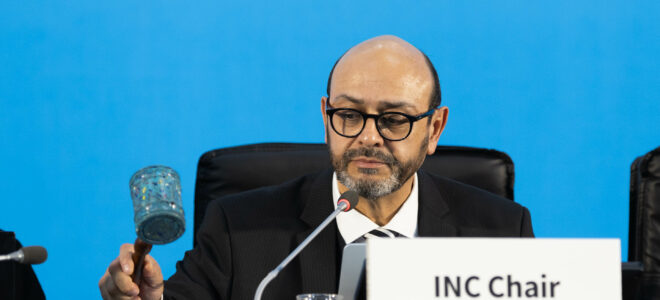
The 5th session of the Intergovernmental Negotiating Committee to Develop an International Legally Binding Instrument on Plastic Pollution, Including in the Marine Environment (INC-5) is taking place in in Busan, Republic of Korea on 25 November – 1 December 2024. An IPCP Member is attending and providing daily summaries.
As the curtains closed on the seventh and final day of INC-5, it was clear how quickly time had flown. Initially, the day promised progress—a new version of the Chair’s non-paper was expected in the morning, followed by regional group discussions, a Bureau meeting, and potentially the adoption of the text at the final plenary. However, the reality of international negotiations on complex issues like plastic pollution once again proved its challenges.
Morning Delays and Growing Tensions
Despite countries working late into the night—some until 2 a.m. or later—significant disagreements remained. Key issues such as primary polymer production, problematic products, chemicals of concern, and financing mechanisms saw little consensus. Unsurprisingly, the Chair delayed releasing the new text. Instead, the day began with a press conference by the High Ambition Coalition, signaling their determination to push the treaty forward. A new term emerged during the event: the “coalition of the willing,” representing over 100 countries committed to reducing primary polymer production.
Yet, the wait continued. The Chair’s new text was finally released around 2:00 p.m., and while it marked an improvement over the compilation text from INC-4, it still contained over 370 brackets—a clear indication of unresolved differences. As colleagues pored over the document, searching for potential loopholes, a sense of urgency grew. The sheer volume of brackets suggested that resolution within the remaining time was unlikely. Instead, the focus needs to be shifted to finding a viable path forward for the whole INC process.
The Long Wait and the Final Plenary
Observers endured yet another round of waiting. By 6:30 p.m., word came that the final plenary would convene at 7:30 p.m. Without pausing for dinner, colleagues and I headed to the plenary room early to secure seats. Despite the scheduled start time, the session did not begin promptly. Attendees passed the time by taking photos at the INC-5 sign, a bittersweet memento of the event.
Rumors began to circulate—some countries reportedly wanted to revert to an earlier version of the text, released on Day 3, rather than proceed with the Chair’s latest version. Tensions rose as the hours ticked by. Finally, at 9:00 p.m., the Chair and the Secretariat staff entered the room, and the final plenary of INC-5 commenced.
A Path Forward Amid Divisions
As expected, the Chair proposed continuing negotiations at a future session, INC-5.2, using the latest text as a starting point. Emphasizing that “nothing is agreed until everything is agreed,” he sought to maintain momentum while recognizing the significant gaps that remained. Low-ambition countries called for bracketing every paragraph, while high-ambition countries countered, though without unified positions.
The plenary dragged on into the early hours, with regions and countries delivering speeches that, while important, became repetitive over time. By 3:00 a.m., the plenary adjourned with a decision: negotiations would resume at INC-5.2, using the Chair’s text as the basis but leaving all issues open for further debate.
Reflections on a Challenging Week
As I bid farewell to colleagues and friends after a long and nerve-wracking week, two key thoughts weighed on my mind:
- The Power of Consensus—and Its Risks
Low-ambition countries demonstrated remarkable organization, leveraging the consensus-based process to stall progress. Meanwhile, high-ambition countries displayed varied levels of commitment, inadvertently providing their counterparts with opportunities to delay and dilute. This underscores a critical flaw in the current system: consensus, while foundational for legitimacy, can be weaponized by a few to derail progress. How can we ensure credibility and inclusivity without allowing obstructionism? - Finding Convergence at INC-5.2
As countries prepare for INC-5.2, there is little indication that positions will shift significantly. In fact, geopolitical developments, such as recent U.S. election results, may harden stances further. However, the emergence of the “coalition of the willing” offers a glimmer of hope. With over 100 countries committed to action, is this a sufficient basis for progress? Major plastic-producing nations remain reluctant to accept binding commitments that threaten their economic interests. How can the global community navigate this impasse to achieve meaningful reductions in plastic pollution?
Looking Ahead
The road to a global treaty on plastic pollution remains long and uncertain. Without a shift in approach, the world risks prolonging the negotiation process indefinitely, while plastic pollution worsens daily. As a society, we have to grapple with these challenges, exploring innovative solutions and fostering cooperation before INC-5.2. Failure to do so could consign us to a cycle of endless debates, with dire consequences for the planet.
IISD coverage:
https://enb.iisd.org/plastic-pollution-marine-environment-negotiating-committee-inc5
